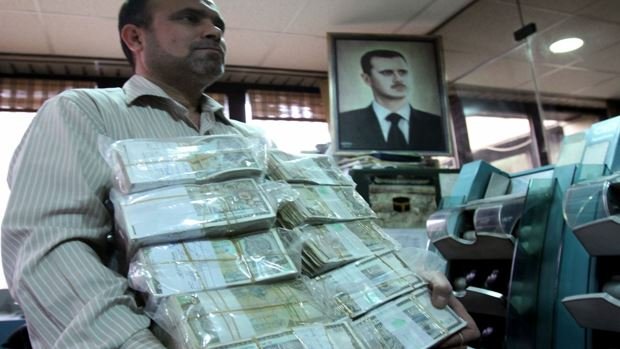Syrian president doubles public sector wages as national currency spirals downwards
Syria’s government has doubled public sector pay while at the same time cutting fuel subsidies, as it tries to boost the war-torn country’s economy. This decision, while intended to alleviate the mounting economic challenges the nation faces, has raised concerns about its potential international economic repercussions and the impact on the Syrian population.
90% of the nation now lives below the poverty level as a result of the currency’s downfall and devaluation. Recently, in areas where the government is powerful, the suffering has led to unusual protests.
You can also read: IS A DECADE LONG SYRIAN WAR COMING TO ITS END?
After President Bashar al-Assad forcefully suppressed nonviolent pro-democracy demonstrations in 2011, Syria was left in ruins and a civil war broke out, which has claimed more than 500,000 lives. Seventy percent of the population, or over 15 million people, need humanitarian aid, with 12.1 million of them being food insecure.
Current Situation of Syria
Due to the spiraling inflation, vulnerable households have been finding it difficult to pay their expenditures. According to the World Food Program, the minimum spending amount is now 62% greater than it had been in May 2022 & 159% above what it was in September 2021.
The trade ministry announced the complete elimination of gasoline subsidies plus the partial elimination of fuel oil subsidies in a separate statement tonight. Petrol will cost eight thousand Syrian pounds ($0.53) each liter instead of three thousand, while fuel oil would cost 2,000 pounds instead of 700.
The reduction of fuel subsidies, according to Prime Minister Hussein Arnous, will benefit the poorest people, lower the budget deficit, and aid in stabilizing the Syrian pound, he stated last year.
The Economic Context
Syria’s economy has been grappling with a plethora of issues in recent years. The devastating civil war that began in 2011 has wreaked havoc on infrastructure, disrupted production, and displaced millions of citizens. These factors, compounded by international sanctions and a collapse in oil prices, have led to rampant inflation, a sharp depreciation of the Syrian pound, and skyrocketing unemployment rates.
The Decision’s Aims and Potential Outcomes
By doubling public-sector pay, the Syrian government aims to address the widespread frustration and unrest among its citizens caused by economic hardship. This move is seen as a gesture of goodwill to rebuild trust with its workforce and to enhance social stability. However, simultaneously cutting subsidies, which have long cushioned the impact of rising prices for essential goods, could exacerbate the hardship faced by the general population.
International Economic Impacts
The decision to increase public-sector pay and reduce subsidies could have a range of international economic consequences:

Inflationary Pressures: One immediate concern is the potential for intensified inflation. As public-sector employees receive higher wages, the increased disposable income could drive up consumer demand. Combined with the reduction in subsidies, which has historically kept the prices of essential goods low, this could lead to a surge in prices across the board.
Impact on Trade Partners: Syria’s trade partners, already facing challenges due to ongoing conflicts, might feel the aftershocks of these economic adjustments. Reduced subsidies could lead to a drop in demand for imported goods, affecting neighboring countries that rely on Syrian trade.
Geopolitical Implications: The international community’s response to Syria’s economic decision could have diplomatic and geopolitical repercussions. Countries that have been providing humanitarian aid or sanctions relief might reconsider their positions, potentially leading to a further deterioration in international relations.
Refugee Crisis: The economic struggles and increased hardships within Syria could push more citizens to seek refuge abroad, potentially aggravating the global refugee crisis. This, in turn, could strain neighboring countries and lead to further instability in the region.
Negative Impacts on the Syrian Population
While the government’s decision aims to alleviate economic stress, it could inadvertently deepen the plight of the Syrian population:
Reduced Purchasing Power: The simultaneous reduction in subsidies and potential inflation could erode the purchasing power of ordinary Syrians. This could lead to a decline in their standard of living and further exacerbate income inequality.
Increased Poverty: For those not directly employed by the public sector, the benefits of increased wages might not be realized. This could result in a growing wealth gap, leaving a significant portion of the population at risk of falling into poverty.
Basic Needs Struggle: Cutting subsidies on essential goods such as fuel, food, and medicine could make these items unaffordable for a substantial portion of the population. This could lead to heightened food insecurity and hinder access to healthcare.
Social Unrest: While the wage increase might appease public-sector workers temporarily, those outside the public sector may feel marginalized and ignored, potentially sparking social unrest and protests.
Analysts Findings
According to analysts, his government lacks the funds to continue the handouts. They have also cautioned that the pay raise for the public sector is likely to lead to increased inflation and the depreciation of the Syrian pound, which might cause the economic advantage to be virtually eliminated within months.
Officials have attributed the country’s economic woes and the suffering of ordinary Syrians to the severe US sanctions that were enacted in 2019 and targeted any foreign individual or organization that knew they were supporting Mr. Assad’s regime. According to the US, the restrictions have no impact on humanitarian relief.

However, Syria’s decision to double public-sector pay and cut subsidies demonstrates the government’s willingness to address its economic challenges head-on.
However, the potential international economic impacts and the negative consequences on the Syrian population cannot be ignored. It is crucial for the international community to closely monitor the situation, offer humanitarian assistance, and engage in diplomatic efforts to ensure that this economic shift does not worsen an already dire situation. While the decision might bring temporary relief to some, a comprehensive and sustainable solution remains essential to truly alleviate the suffering of the Syrian people and foster economic stability in the region.


